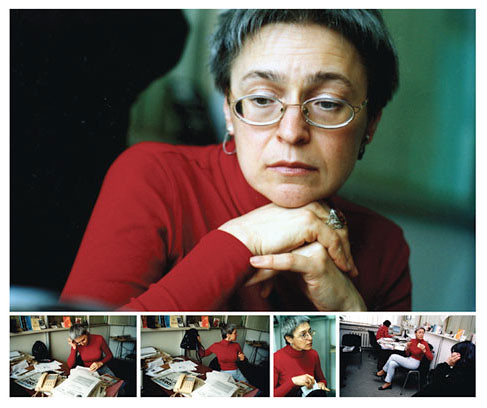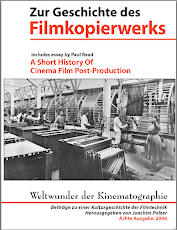 Film-Nr.: 571
Film-Nr.: 571Vorführungstermin: Sonntag, 16. August 2009, 20.30 Uhr [VN57]
Themenschwerpunkt: Unglaubliche Geschichten aus Russland (5) | Würdigungen (5)
Englischer Titel: 211: Anna
Originaltitel: 211: Anna
Deutscher Titel: 211: Anna
Herkunft: Italien 2009
Laufzeit: 90 min.
Sprachfassung: Russische Originalfassung mit englischen Untertiteln
Regie: Paolo Serbandini, Giovanna Massimetti
Produzent: Alessandro Papini, Stefano Alpini
Drehbuch: Paolo Serbandini, Giovanna Massimetti
Schnitt: Gabriele Spinelli, Vittorio De Felice
Kamera: Vladimir Ivanov
Musik:
Produktion: POLIS SRL., Pisa (Toskana)
URL Film-Homepage: http://www.211anna.it/
Premierenstatus: Deutsche Erstaufführung
Bisherige Aufführungen: Sundance Film Festival, Utah (USA)
Kurzinhalt: Die Lebensgeschichte der Anna Politkovskaya, zugleich die Überlebensgeschichte ihrer Familie. Anna war die 211. nach dem Zusammenbruch der Sowjetunion ermordetete Journalistin auf dem Gebiet der ehemaligen SU, daher der Filmtitel.
Englische Synopsis: The story of Anna Politkovskaya (30 August 1958 – 7 October 2006), a Russian journalist and human rights activist well known for her opposition to the Chechen conflict and Russian president Putin. Politkovskaya made her name reporting from lawless Chechnya, where many journalists and humanitarian workers have been kidnapped or killed. She was arrested and subjected to mock execution by Russian military forces there, and she was poisoned on the way to Beslan, but survived and continued her reporting. She authored several books about Chechen wars and Putin's Russia and received numerous prestigious international awards for her work. She was shot dead in the elevator of her apartment building on October 7, 2006.
Englische Werkbeschreibung: Anna Stepanovna Politkovskaya (Russian: 30 August 1958 – 7 October 2006) was a Russian journalist and human rights activist well known for her opposition to the Chechen conflict and Russian president Putin. Politkovskaya made her name reporting from lawless Chechnya, where many journalists and humanitarian workers have been kidnapped or killed. She was arrested and subjected to mock execution by Russian military forces there, and she was poisoned on the way to Beslan, but survived and continued her reporting. She authored several books about Chechen wars and Putin's Russia and received numerous prestigious international awards for her work. She was shot dead in the elevator of her apartment building on October 7, 2006, the birthday of Vladimir Putin, who was publicly accused by Alexander Litvinenko of ordering her murder. Litvinenko subsequently died from poisoning by radioactive polonium. By now over 10 people have been arrested within the scope of the official investigation; however, no organiser's name has yet been officially announced. Politkovskaya was born Anna Mazepa in New York City in 1958 to Soviet Ukrainian parents, both of whom served as diplomats to the United Nations. She grew up in Moscow and graduated from the Moscow State University Department of Journalism in 1980. Politkovskaya was a citizen of both the United States of America and the Russian Federation. From June 1999 to 2006, she wrote columns for the biweekly Novaya Gazeta. She published several award-winning books about Chechnya, life in Russia,and President Putin's regime, most recently the book Putin's Russia. Outside Russia, Politkovskaya received wide acclaim for her work in Chechnya,where she frequently visited hospitals and refugee camps to interview the victims. She said about herself that she was not an investigating magistrate but somebody who describes the life of the citizens for those who cannot see it for themselves, because what is shown on television and written about in the overwhelming majority of newspapers is emasculated and doused with ideology. Her numerous articles critical of the war in Chechnya described abuses committed by Russian military forces, by Chechen rebels, and by the Russian-backed Chechen administration led by Akhmad Kadyrov and his son Ramzan Kadyrov. Politkovskaya chronicled human rights abuses and policy failures in Chechnya and elsewhere in Russia's North Caucasus in several books on the subject, including 'A Dirty War: A Russian Reporter in Chechnya' and 'A Small Corner of Hell: Dispatches from Chechnya', which painted a picture of brutal war in which thousands of innocent citizens have been tortured, abducted or killed at the hands of Chechen or federal authorities. One of her most recent investigations was about alleged mass poisoning of hundreds of Chechen school children by an unknown chemical substance of strong and prolonged action, which made them completely incapable for many months. 'People often tell me that I am a pessimist, that I don't believe in the strength of the Russian people, that I am obsessive in my opposition to Putin and see nothing beyond that,' she opens an essay titled Am I Afraid?, finishing it - and the book - with the words: 'If anybody thinks they can take comfort from the 'optimistic' forecast, let them do so. It is certainly the easier way, but it is the death sentence for our grandchildren.'

This documentary speaks about 30 years of Soviet Union/Russia history saw through the family of Anna, the husband, a fomous journalist in perestroika period, and the sons, some interview to the Anna's friends and about the history of a separate investigation of Politkovskaya's murder,carried out the staff journalists of Novaya Gazeta, during which they closely cooperated with the General Prosecutor's Office. On August 30, 2007, Novaya Gazeta journalists and Anna's son Ilya Politkovsky issued a statement about the ongoing investigation. In it they claimed that not all the people involved had been arrested, the Prosecutor's Office had yet to do lots of routine work to prove the guilt of those arrested, but also that Novaya Gazeta's own investigation shows that 'the arrested people were really involved in this crime in this or that degree'. The major issue addressed by the Novaya Gazeta journalists was the leak organized in the media, which has seriously complicated the work of investigators and could have let other people involved get off. According to the journalists, 'It seems that someone wanted to make the current list of suspects final and, in addition, to prevent the solving of other crimes that might possibly have been committed by the people arrested.' Details of the investigation were kept secret for almost ten months, being controlled by the chief of the official investigative group and Novaya Gazeta journalists. On August 27, the Prosecutor General and special service officers held press conferences. Although this was not a major breach in the secrecy of the case (besides one of the arrested, FSB Lieutenant Colonel Pavel Ryaguzov, being named), it triggered a snowball of publications, as well as public appearances by minor officials. Two things had worsened the deal: first, as Sergey Sokolov has mentioned in his September 2 interview, 'each office had people who had obtained a bit of information — and they started to sell it to journalists', and second, the seeming involvement of some people in these structures, due to 'interpenetration of crime and law enforcement bodies', internal intrigues and fear that if investigators 'unraveled this tangle, then the details of many celebrated unsolved cases would be disclosed'. With regard to whoever ordered the murder of Politkovskaya, the Novaya Gazeta journalists have noted: 'We do not exclude possible involvement by 'runaway oligarchs' and other characters. There are several versions of who was the client in Politkovskaya’s murder. We believe that the client hasn't left Russia. None of the versions have been proved with evidence up to now and so all speculation must end for the moment.'

Kurzbio Regie in Englisch: Giovanna Massimetti is a television and screenplay writer, as well as director. Since 1991 she has worked for RAI (Italian State Television) on various programs, entertainment shows and news. But it was always her dream to make movies. She has directed several short films, shown in international festivals such as Valencia Cinema Jove and the Torino Film Festival. With Paolo Serbandini, she has written a script set in the Moscow of 1930s, at the beginning of the Stalinist terror. Paolo Serbandini is journalist and television and screenplay writer. He studied Philology at the University of Moscow, and has long been associated with the Russian world. Among others things, he has worked with Russian directors like Bondarciuk and Konchalovsky and as assistant director on I girasoli (‘Sunflowers’) by De Sica. He is the author of the script and screenplay of Giuliano Montaldo’s latest film, based on the life of Dostoyevsky. For Italian television, he has made two documentaries about attempted coups d’etat in Russia (1991 and 1993). He was personally acquainted with Anna Politkovskaya in Moscow.
Hintergrund-Info zur Entstehung des Films: A friend rang us, on the evening of 7 October 2006, to break the news of Anna’s murder. We were driving in the south of France, on a trip for work. We turned on the radio and began to search frantically for a radio station broadcasting the news. We refused to believe it, even though we were well aware of the risks Anna was running and despite the fact that she herself had said to us: “I’m amazed they haven’t killed me yet”. We had first met her in Moscow in December 2003. But we had been familiar with her indomitable journalistic force for some time, and had read her books and articles. We saw her again the following year, in early September. Shehad just been discharged from a clinic after they had tried to poison her in order to stop her reaching Beslan. She was pale and fragile, but no less determined for that. The idea of writing a film about Anna came to us a few months later. We started gathering material, reading and rereading her books and articles, doing research on internet. We wrote a script. Some director friends read it. “Great, but too expensive”, they said, “the Italian film industry doesn’t have the funds for a film like that”. We picked the script up again some time later. There was one thing we didn’t know before, and found out only as we were researching the subject. Anna had a husband, Sasha Politkovsky, leading journalist and host on a Soviet television program that had first shown the country for what it really was and not veiled by regime propaganda. Sasha had become so famous that he had even been elected member of parliament. Then following the collapse of the Soviet Union, his fame had faded and he had returned to the shadows. It was at that point that his wife Anna was to take center stage for a few years, achieving worldwide acclaim for her reportage from Chechnya and denunciations of the Putin regime. We realized that we had two long interviews with Anna and a great deal of footage shot in Russia over the years. This was the starting point for filming our documentary about the pair of journalists. Husband and wife. Both famous, but in totally different times. Telling their story was like chronicling twenty years of Russian history. And so it was that thanks to friend who “reinvented himself” as a producer in order to provide us with the means to make the film, that 211: Anna saw light.
Dieser Film aus dem Programm des Globians Doc Fest wird wiederholt und zwar am 11. November 2009 um 18.30 Uhr im Eiffelturm-Kino Berlin (im Centre Français de Berlin), Müllerstr. 74, U-Bahnhof Rehberge/Afrikanische Straße
GLOBIANS DOC FEST BERLIN
August 12 - 17, 2009
Kino Toni, Antonplatz












Keine Kommentare:
Kommentar veröffentlichen
Hinweis: Nur ein Mitglied dieses Blogs kann Kommentare posten.